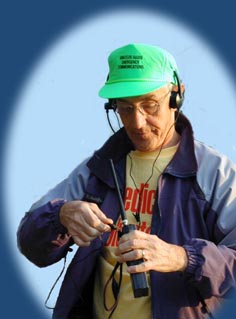  Communication! This is what Amateur radio operators do, and do over vast distances and often under terrible conditions. Radio amateurs send signals directly, station to station, or bounce them off of repeaters and satellites.
Communication! This is what Amateur radio operators do, and do over vast distances and often under terrible conditions. Radio amateurs send signals directly, station to station, or bounce them off of repeaters and satellites.Part of a radio amateur's "payback" to his or her community is to provide communications for community events such as the Pittsburgh marathon and the Vintage Grand Prix.
Why use radio amateurs? Why not use the emergency service networks which are already in place? While the runners and the race drivers are the real stars, this page is devoted to the work of the radio hams, and offers an explanation of the kinds of "traffic" - ham talk for communications - that is passed, and how it all works together. For details and pictures of each race, click on the pictures below.
|
 |

|